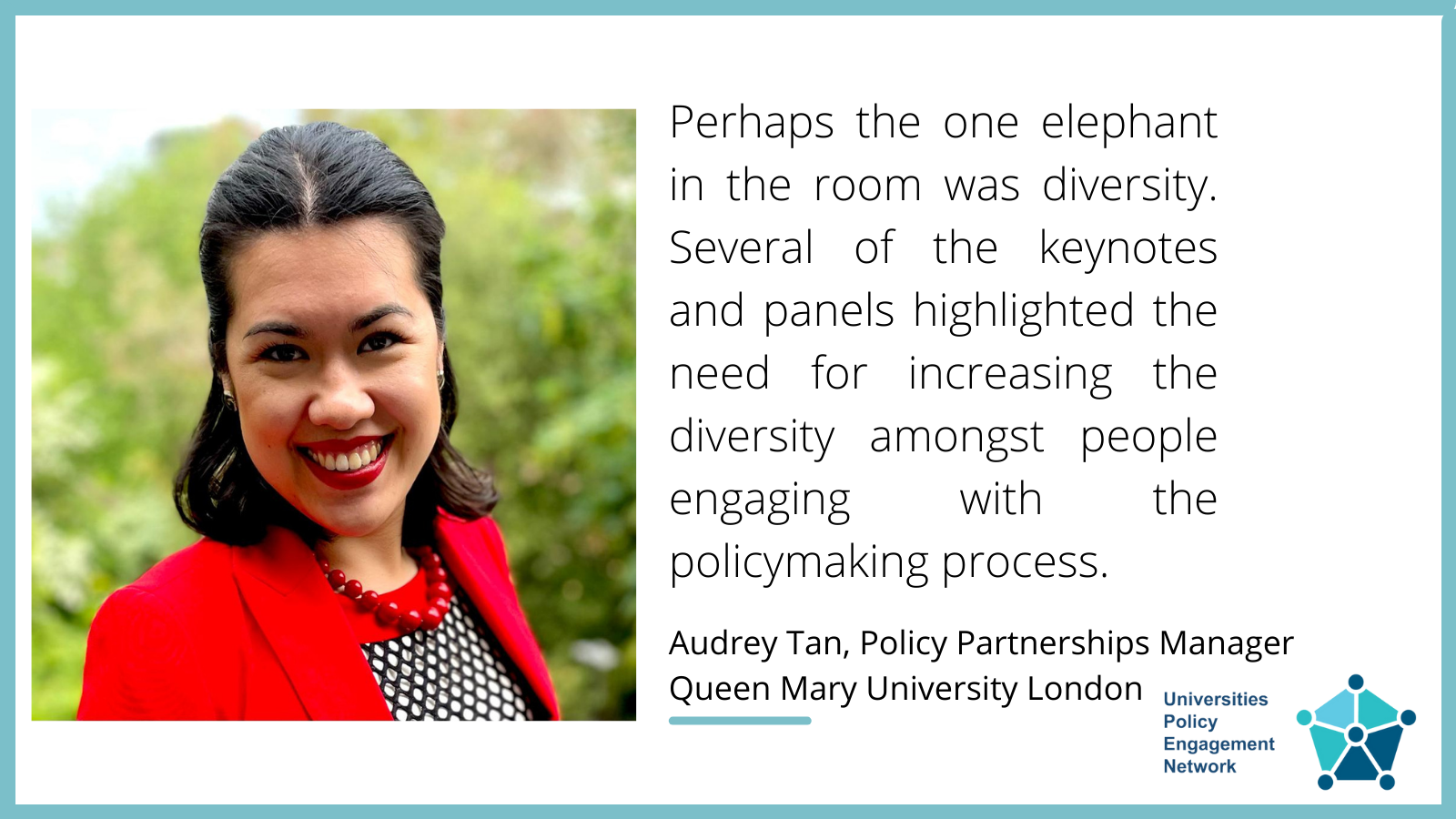The future of knowledge mobilisation…is bright (if a bit white)

One would think it difficult to match the jubilation of the hoard of Ashes-bound men downing beers on my 8am train to Birmingham, and yet, the atmosphere at the UPEN conference was comparable (minus the cans of Stella). When I arrived, there was a distinct air of excitement as colleagues from across the network met for the first in-person UPEN conference post-Covid.
Keynotes from Jonathan Mills (Director General for Energy Markets and Supply) and Grant Hill-Cawthorne (Librarian of the House of Commons) and panels on local, regional, and devolved policy engagement; ARIs; and funding sparked enthusiastic questions and discussions on ‘the future of knowledge mobilisation.’ Sitting on the train back to London, the carriages now much more subdued with many of the cricket-goers napping off the day, I tried to condense the day down into my three main takeaways.
The future of knowledge mobilisation is:
1. leveraging existing research in a timely way to answer policy questions.
Mechanisms for collating and synthesising the evidence, such as systematic reviews, rapid reviews or living reviews are tools that can help us do more (i.e. informing policymaking) with less (i.e. new research). There are already initiatives and programmes focused on creating capabilities and structures for rapidly responding to evidence needs: the Rapid Response functions of the NIHR Policy Research Units, UCL’s Evidence for Policy and Practice Information and Co-ordinating Centre (EPPI-Centre) and Rapid Research, Evaluation and Appraisal Lab (RREAL), Cochrane Rapid Reviews, POST’s Rapid Responses, and NICE’s living guidelines are just some examples. We need to build on this momentum and create pathways to ensure that policymakers at all levels of government can access these kinds of services.
2. universities expanding their impact as centres of research to help local areas and communities adapt and respond to wicked problems and crises.
Pandemics, and cost of living crises, and climate change, oh my! We live in a world that is increasingly unstable with a seemingly never-ending cycle of disasters. Initiatives such as Civic University Agreements and co-production models need to be explored as routes by which universities embed themselves locally to co-develop place-based solutions.
3. professionalising the policy profession.
No one grows up saying they want to be a knowledge broker or policy analyst. Through a series of seemingly (un)fortunate events I managed to find my way into the policy engagement sector, and it seems to be a similar story amongst colleagues. Jonathan Mills cited examples of efforts being made within the civil service to introduce foundational skills across the workforce. Executive education programmes such as the Civil Service and LSE Executive MPP and the Policy Professions unit run with the Open Innovation Team are helping civil servants develop the necessary skillsets to be informed consumers of evidence and effective policymakers. However, similarly coordinated development programmes for those working within academia wishing to translate knowledge out don’t currently exist. There’s a growing body of evidence assessing the role of knowledge brokers in academic-policy engagement and we need to build on this to develop formalised education programmes – certifications, accreditations, or even MSc programmes. Does anyone else smell a PhD project here??
Perhaps the one elephant in the room was diversity. Several of the keynotes and panels highlighted the need for increasing the diversity amongst people engaging with the policymaking process. However, looking around the room at the conference, there were only a handful of us who were from ethnic minority backgrounds. It seems that as well as addressing challenges relating to equality, diversity and inclusion (EDI) in academic-policy engagement, UPEN would benefit from diversifying its own membership base. And not just in terms of ethnic representation, but through involving people from a variety of different backgrounds and not only just as members, but in leadership as well (I note that UPEN has had six chairs, of which only one has been female and all have been White).
Interestingly, while the EDI Sub-Committee's report on 'Surfacing Equity, Diversity, and Inclusion in Academic-Policy Engagement', lists recommendations for the UPEN Committees, Sub-Committees and institutional members to deliver more diverse academic-policy engagement, the report doesn't actually make recommendations for how UPEN can increase diversity within its own organisation. UPEN should consider putting its house in order first to avoid a 'do as we say, not as we do' situation and exacerbating issues of privilege and elitism that already exist in the academic and public policy sector.
The UPEN conference was streamlined and no frills, I appreciated that the only hand-outs were a file folder (now organising some of my papers at home), a pad of paper, and the agenda for the day. I returned to London exhausted and exhilarated, with new connections, inspiration and ideas, and a seedling concept for a PhD project, much more valuable than the usual conference tat I’d say!










































































































